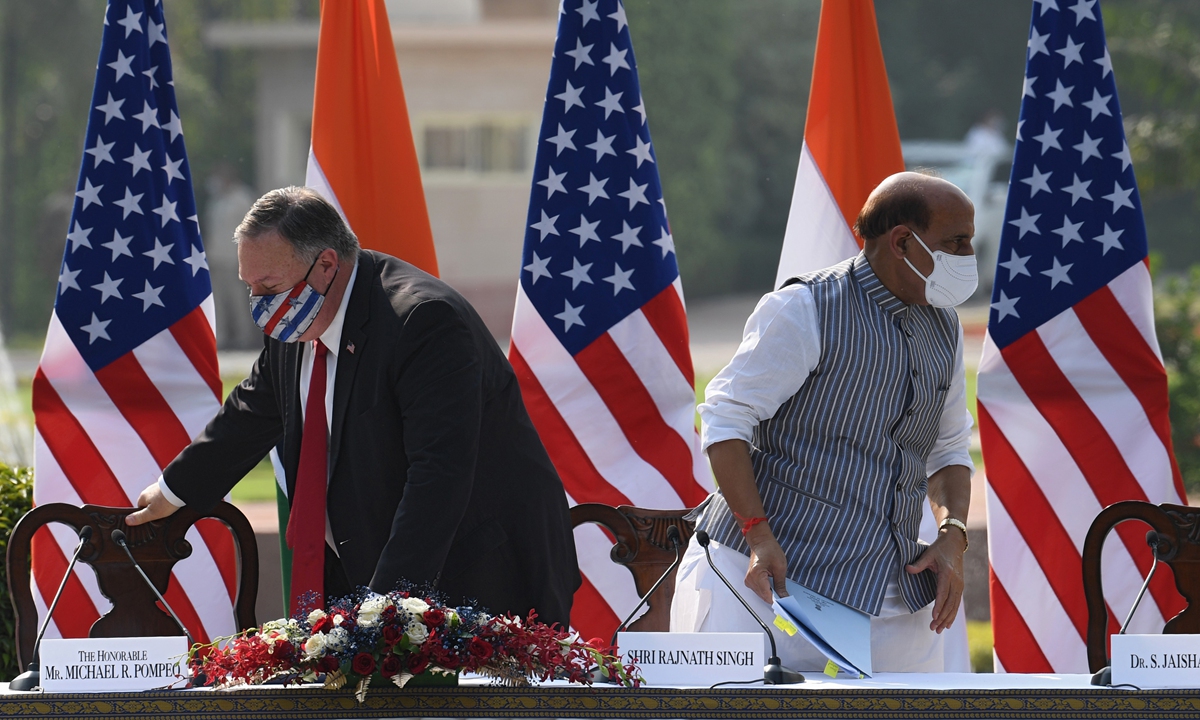Tying itself to US chariot against close neighbor not a consensus in India
By Lu Yuanzhi Source: Global Times Published: 2020/11/1 19:32:08

US Secretary of State Mike Pompeo (left) and India's Defence Minister Rajnath Singh leave after addressing a joint press briefing in the lawns of Hyderabad House in New Delhi on October 27, 2020. Photo: AFP
Washington and New Delhi on Tuesday signed the Basic Exchange and Cooperation Agreement on Geospatial Cooperation, which will allow New Delhi access to crucial intelligence that will have implications in any potential military conflict, after their 2+2 high-level talks. This signals that military cooperation between the two countries has taken a step forward.
As the two countries that have been worst affected by the coronavirus pandemic, why did they take the risk of holding face-to-face discussions? Getting tough on China has become a bipartisan consensus in Washington. With the election approaching, it was the last diplomatic meeting for the current administration of US President Donald Trump to exploit its hard-line stances against China to win more votes. Therefore, the US further peddled its Indo-Pacific Strategy, and made extra efforts to rope in India to counter China. From the perspective of India, as little progress has been made in its border conflicts with China, India intends to use the enhanced military cooperation with the US to pressure China to make concessions.
As the two countries move closer, many media outlets and analysts argue whether India is already a "quasi-ally" of the US. Qian Feng, director of the research department of the National Strategy Institute at Tsinghua University, told the Global Times on Sunday, "US-India ties can be described as being upgraded to, at best, a 'quasi-alliance' only in terms of the military, but it is far from reaching a 'quasi-alliance.' This is because the two countries' latest cooperation has mainly focused on military and defense, yet they have repeated discords and frictions in fields such as economy and diplomacy."
In an editorial published on Wednesday by the Hindu, a Chennai-based Indian media outlet, it argues that, "While strengthening its US ties, India must not let this interfere in the dispute with China." At the end of the article, it said, "The conspicuous silence from External Affairs Minister S. Jaishankar in response to Mr. [US Secretary of State Mike] Pompeo's comments on China is also a sobering reminder that while India appreciates support from the US, it retains its strategic autonomy in dealing with threats and troubles with its biggest neighbor."
Against the backdrop of deteriorated China-India ties due to their border conflicts, as well as the rising nationalism in India, many Indian politicians, strategists, and media outlets are calling to boost cooperation with the US, in a bid to counter China. However, there are still many Indians who disapprove of this strategy.
Since Trump took office in 2016, his administration has been cranking up the "America First" policy, repeatedly underlining the significance of safeguarding its national interests. It has also urged its allies to share more obligations and has withdrawn from a series of international organizations to shed its responsibility.
China, on the other hand, has maintained close economic exchanges with most countries, and has engaged in increasing international cooperation, which embodies its image as a responsible power. The international community is clearly aware of these moves by the US and China.
To check and balance China's development, the US has spared no effort to build a "global anti-China alliance," hoping its allies and partners will stand with it rather than with China. Most countries, including India, are reluctant to take sides between the two giants.
The core of every country's foreign policy is to safeguard its own national interests. In the context of deteriorating China-US relations and no easy and quick solution to the China-India border conflicts, India is carefully considering how to deal with the two great powers. When it comes to geography, the US lies far away from India, while China is its close neighbor that cannot be moved away. Even though India is tough on border issues against China, it will go against India's national interest if India ties itself to Washington's anti-China chariot.
Qian said, "If China-US relations cannot turn positive, the US will continue to woo India. New Delhi will continue to move closer to Washington. However, India, which harbors a great-power dream, will just be inclined to the US, rather than being dependent or becoming a little brother of the US. India will continue to retain its independence in terms of diplomacy."
Posted in: OBSERVER